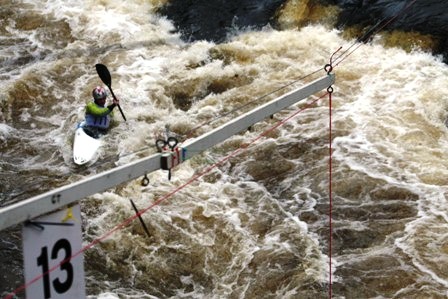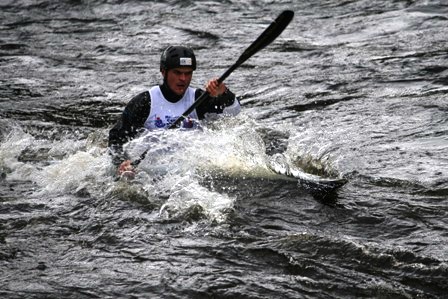
Marauders at the gate or harmless outdoor pursuit?
Asking for the keys
Ash Charlwood of Canoe Wales explains the issues of access to inland waters and wonders what it will take for this important leisure resource to be made available to the public.

Marauders at the gate or harmless outdoor pursuit?
The rivers of Wales are constantly moving and changing. So is the discussion that surrounds whether the public can use inland water without challenge. Historically anglers have objected to others, but particularly canoeists, using the inland waters of Wales and recently this conflict has become more publicised.
After a petition was raised by the Welsh Canoeing Association (now Canoe Wales), the Welsh Assembly Government’s petitions committee released a report in April 2009. The conclusion of this report states: “We therefore believe that all people should have the right of access to inland water in Wales. Access should not be based on the vagaries of permissions bestowed or ability to pay but on the fundaments of equity and social justice.” The committee concluded that “we agree with virtually all the witnesses who gave evidence to this inquiry that the current situation in Wales is untenable and unworkable. Quality, clarity, certainty and permanency should be the watchwords for the future. We conclude there is a case for reforming the current framework so that there is a legal right of non-motorised access along inland water in Wales.”
The petitions committee also recommended that a wider ranging inquiry be undertaken, a proposal that was accepted by the sustainability committee on 24 June 2009. This committee collated evidence until 19 September 2009 and it is interesting to note one particular piece of evidence from the Rev Douglas Caffyn. In this submission the facts are discussed to show that the law has been incorrectly interpreted since 1830 and Mr Caffyn concludes that the National Assembly for Wales need only confirm traditional rights rather than allow the current situation to continue.
Having initiated the petitions committee submissions, Canoe Wales was pleased to be invited to give evidence. On 24 September 2009 we explained that while canoeing governing bodies have been representing the interest of canoeists for more than sixty years it is now clear that this is a far bigger issue than canoeing versus angling. Anglers originally received their rights for sustenance fishing but this has now moved into the realm of sporting rights. While the public purse puts a lot of money into supporting the river enhancements and improvements, at present the benefit goes only to anglers.
Canoe Wales suggested that Mr Caffyn’s evidence explains the large number of old vessels found in river beds and the many pictures of coracles using the rivers. It also raises an issue regarding how private rights have been conveyed over the years. Private rights are held subject to public rights and in this one fully referenced document it is suggested that the public right which was widely accepted until 1750 has never been repealed. England and Wales are currently the only countries in the world that suffer under this imposition. For many years other countries have been creating legislation to bring clarity for water users. Most recently, in 2003, Scotland introduced legislation that makes a presumption in favour of access. This law created a legally binding ‘code of conduct’ not only for outdoor recreation but also for land managers. The Scottish law is seen as one of the most advanced piece of access legislation in Europe.
Canoe Wales pointed out that while individuals or private organisations interpret the law Wales loses out. The Environment Agency tells us that more than half the population enjoys being in or around the water but without a framework for access the situation is like having a huge leisure centre and not letting anyone use it. The environment around rivers can be sensitive but currently there is no mechanism to educate participants or influence their behavior. The only mechanism available to landowners is the civil action of trespass and this is not being used. With clarification of law the environment and its protection could be brought into line with modern understanding.
The media has represented some aspects of the conflict, most recently in the Griff Rhys Jones series, Rivers, but it is pretty obvious that if we want a healthy lifestyle that allows people to do things that help tourism, small business, education and personal development inland water has a role to play. It is a massive resource that swimmers, canoeists, anglers, birdwatchers, picnickers and countless other groups enjoy but not being clear on the rights and responsibilities is confusing for those wanting to enjoy the water environment and damaging to the economies of England and Wales.
There is an enormous unused leisure centre out there. We’re not asking for it to be built; we’re just asking for the keys and when it will be open.
Ash Charlwood is the policy officer at Canoe Wales
For more information on evidence to the Welsh Assembly’s sustainability committee visit the Welsh Assembly website and follow the links for the business committees. Here's some help.
The Leisure Review, October 2009
© Copyright of all material on this site is retained by The Leisure Review or the individual contributors where stated. Contact The Leisure Review for details.
Download a pdf version of this article for printing
